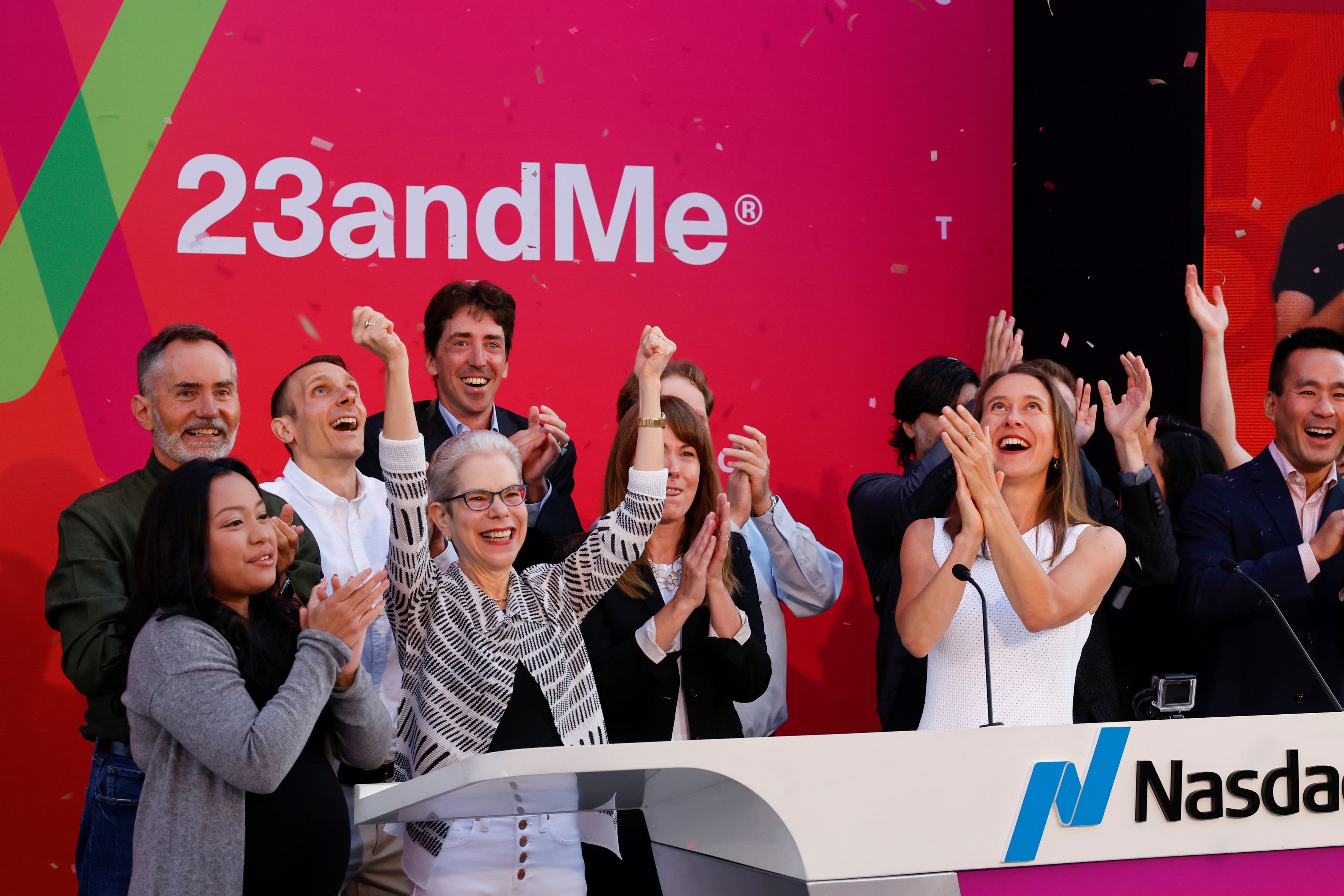
The newest trade in the stock market is "ME."
Personalized medicine and at-home genetic testing kit company 23andMe went public on Thursday through a merger with a Richard Branson SPAC, VG Acquisition Corp., in a deal that raised near-$600 million and valued the company at $3.5 billion.
23andMe shares rose by 21% on the Nasdaq in its first day of trading as a public company.
Founded by Anne Wojcicki — the former spouse of Google founder Sergey Brin, who was an early investor in the company — 23andMe was created 15 years ago. Along with Ancestry, it has helped pioneer the idea that genetic testing is not just a medical field, but a big consumer business. Its at-home testing kits, which allowed people to learn about their genetic profiles and ancestry by sending a bit of saliva through the mail, ushered in a new era of personalized medicine, though not without controversy.
23andMe, a five-time CNBC Disruptor 50 company, has not had a straight or sure path to success as a public company.
It faced FDA scrutiny earlier in its history; continues to face questions about consumer privacy as it gathers genetic information on millions of individuals; ran into financial challenges in recent years as the market for personalized genetic tests seemed to get saturated; skepticism over the basis for its gene-based risk analysis remains contentious; and as it dives deeper into drug development, a gap in its current customer base and underlying genetic data between a majority European genetic profile and underrepresentation of many minority and ethnic groups.
"It will take time ... really making sure we are getting all communities to participate in research," Wojcicki said in an interview with CNBC's "TechCheck" on Thursday morning. "You can't make discoveries in a population if you don't have those people participating. We need the right customers and to represent the product back to them in the right way."
Wojcicki says the company sees big things ahead for both its consumer and drug research & development platforms. Roughly 80% of 23andMe's now-11 million members opt into sharing their genetic information (de-identified) for research in drug development.
"Our genetics represent all of life on this planet, and we have the opportunity to understand what it means and with that, it will improve your own life but also contribute to all kinds of research discoveries," Wojcicki said.
She says the controversy over the medical utility of the information when put in the hands of consumers won't go away, and it ranges on a spectrum from critical, clinical information, such as mutations in the gene that causes breast cancer, BRCA, to "more controversial" genetic information on Alzheimer's Disease variants. Some individuals with higher risk of blood clots make the decision to walk around more during plane flights as a result of their 23andMe reports.
But she added that consumers have shown they want this information to help them make decisions.
She said in the case of Alzheimer's risk, "This information ... really influences how they live their life ... how they plan to retire ... plan to be older."
Her own 10-year-old son used the company's lactose intolerance analysis to diagnose his stomach aches and Wojcicki herself, while reticent to discuss her personal use of the product, did say as the daughter of a woman who suffered from breast cancer and who has a higher risk of the disease, the information does influence her decision on having that "recreational glass of wine."
"The last 15 years was putting together the infrastructure for how we can take off, proving to consumers we can get the information and proving they can understand it without a medical professional," she said.
She says the key to its future is that consumers want to use the information to not only change their life but contribute to drug discovery.
23andMe has 40 programs underway on its drug discovery platform.
"We want them to truly have a personalized health-care experience and ... benefit the human genome from seeing all of this aggregated data turned into therapeutic programs," Wojcicki said. "When I think about the future of therapeutics, in the next five years it is really about moving these programs forward and getting them into the clinic."
The company also recently launched a subscription product to introduce more content and services for consumers who want to take additional steps after their genetic reports.
"We get thousands of people who call every week to the customer care team who would like to know how to use this information and apply it to live a healthier longer life," she said.
The IPO market has already set an annual record for deal volume in 2021, at $171 billion, and only halfway through the year. Average first day trade gains in deals this year have been above 40%. Though both traditional IPO market and SPAC returns have cooled off in recent months, with the Renaissance IPO ETF and the CNBC SPAC Index negative year-to-date after starting 2021 with a continuation of last year's big gains. Meanwhile, concerns about SPAC deals have mounted and some high-profile SPACs like Branson's Virgin Galactic and electric vehicle maker Lordstown Motors have shown high levels of volatility.
Nevertheless, Branson and other investors are planning to bring another space business public, satellite internet service Virgin Orbit, via a SPAC in the weeks ahead.
This story has been updated for the company's closing price in its first day of trading on Thursday.
SIGN UP for our weekly, original newsletter that goes beyond the list, offering a closer look at CNBC Disruptor 50 companies, and the founders who continue to innovate across every sector of the economy.
https://ift.tt/3iRH06W
Business
Bagikan Berita Ini















0 Response to "Genetic testing company 23andMe rises in first trade after Richard Branson SPAC merger - CNBC"
Post a Comment